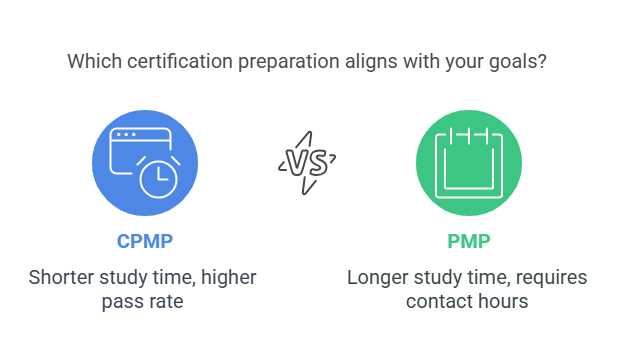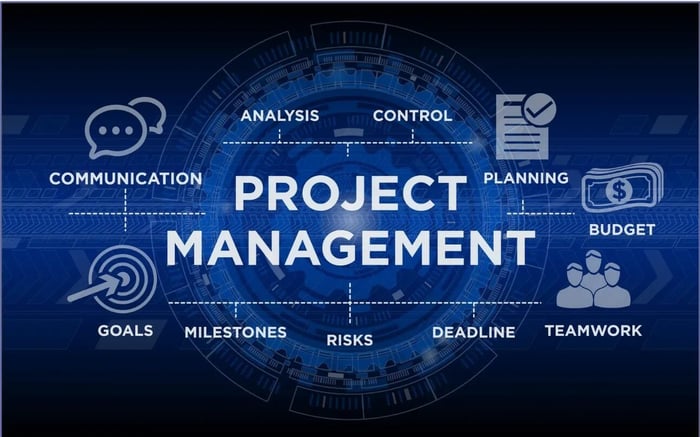Table of Contents
- Project Management Certifications Face Off
- Certified Project Management Professional (CPMP) vs. PMP: What They Actually Mean 📃
- Side-by-Side Comparison Table 🏋️
- Career Opportunities 🚀
- 🎯 Career Path Comparison by Industry
- Certification Process: What It Takes ⏳
- Certified Project Management Professional (CPMP) vs. PMP: Which is Better in 2025? 🌏
- Global Recognition & Credibility 🌐
- 10 Lesser-Known Facts You Should Know About Certified Project Management Professional (CPMP) vs. PMP 🤔
- CPMP vs. PMP: Final Thoughts 🚀
- FAQs
Project Management Certifications Face Off
Welcome to the ultimate showdown between Certified Project Management Professional (CPMP) vs. PMP! It's 2025, AI is automating half your emails, and you still can’t decide which certification to pursue? Don’t sweat it—we’re here to sprinkle clarity, a dash of humor 🥳, and a whole lot of expert insight to help you choose the right path in your project management journey.
If you’ve been up all night Googling things like "CPMP or PMP for career growth," "project management certs in 2025," or "how to not cry during PMI exams," you’ve hit the jackpot. Let’s settle this like the professionals we are — with charts, facts, and maybe a few emojis.

Certified Project Management Professional (CPMP) vs. PMP: What They Actually Mean 📃
This section introduces the certifications, their history, and who each is best suited for.
What is CPMP?
The Certified Project Management Professional (CPMP) is a globally recognized certification offered by the EC-Council, focusing on practical project management techniques with a strong emphasis on IT and technology-driven projects.
What is PMP?
The Project Management Professional (PMP) program is offered by the Project Management Institute (PMI) and is arguably the most prestigious certification in the industry. It tests both the theoretical and practical sides of project management, following PMI’s PMBOK (Project Management Body of Knowledge).
"While PMP leans on traditional methodologies, CPMP brings more flexibility and tech-relevant modules to the table."
Side-by-Side Comparison Table 🏋️
We break it down by key factors like cost, eligibility, exam difficulty, and relevance in 2025.
Feature | CPMP | PMP |
Offered By | EC-Council | Project Management Institute (PMI) |
Focus Area | Practical, Tech/IT Projects | Broad PM Across All Industries |
Exam Cost | $450 | $555 (Non-members), $405 (PMI Members) |
Eligibility | No formal prerequisites | Bachelor's + 3 yrs experience OR equiv. |
Exam Format | 2.5 Hours, 150 Questions | 4 Hours, 180 Questions |
Renewal Requirements | Every 3 Years | Every 3 Years + 60 PDUs |
Salary Potential 💰 | ~$92,000/year (Avg in 2024) | ~$120,000/year (Avg in 2024) |
Best For | Tech-Savvy PMs, Agile Environment | Experienced PMs in Structured Environments |
Recognition | Rising, especially in tech sectors | Industry Gold Standard |
Career Opportunities 🚀
Explore how each certification boosts your job profile and access to promotions.
CPMP Careers
CPMP holders are seen increasingly in agile startups, tech consulting firms, and cybersecurity-focused teams. It’s a go-to cert for modern, lean project setups where flexibility beats formality.
PMP Careers
A PMP still reigns supreme in corporate, engineering, construction, and government roles. PMP is often a mandatory requirement for senior PM roles.
According to CIO.com, PMP-certified professionals earn up to 25% more than their non-certified peers.
🎯 Career Path Comparison by Industry
Not all project management certifications fit every industry like a glove 🧤—so here’s how CPMP and PMP stack up across different fields:
Industry | Preferred Certification | Reason |
IT & Software | PMP | Globally recognized, aligns with complex frameworks like Agile & Scrum |
Healthcare | CPMP | Tailored for practical leadership, less theory-heavy |
Construction | PMP | PMP’s detailed risk & scope management is highly valued |
Manufacturing | CPMP | CPMP’s hands-on approach suits operational-focused roles |
Finance | PMP | PMP's structured methodology is ideal for compliance & precision |
Government | Both | PMP is often preferred for public projects; CPMP for internal teams |
🔍 Bottom Line: Choose your certification based on industry norms and the job roles you're eyeing.
Certification Process: What It Takes ⏳
Here we look at study duration, exam format, pass rates, and prep resources.

CPMP Preparation
Study Time: 1-2 Months
Training Required: Optional, but recommended
Pass Rate: ~70%
PMP Preparation
Study Time: 3-6 Months
Requires: 35 Contact Hours
Pass Rate: ~50%
Pro Tip: If you're still exploring which path fits your career goals, this detailed guide on the PMP certification can help clarify how it compares to other credentials in the industry.
Certified Project Management Professional (CPMP) vs. PMP: Which is Better in 2025? 🌏
This section provides a perspective on future-proofing, skill trends, and industry shifts.
The rise of AI, remote work, and hybrid methodologies has made CPMP more relevant for dynamic, cross-functional teams. However, PMP remains unbeatable for large-scale organizational leadership.
A 2024 report by TechRepublic suggests that hybrid project management certifications like CPMP will grow 30% by 2026.
Global Recognition & Credibility 🌐
Discusses where these certifications are recognized and how employers view them globally.
While PMP is still king in the U.S., Canada, and EU, CPMP is rapidly gaining traction in Asia, the Middle East, and Africa, especially in IT consulting and SaaS startups.
Fun fact: Indeed lists over 50,000 active PMP-tagged jobs as of Q1 2025.
Not all certifications are created equal on the global stage 🌐. Here’s how CPMP and PMP perform internationally:
Region | CPMP Recognition | PMP Recognition | Notes |
North America | Moderate | High | PMP is often required in job listings |
Europe | Growing | High | Both certs accepted, PMP preferred in larger firms |
Asia-Pacific | Moderate | High | PMP holds high prestige in tech & IT industries |
Middle East | Moderate | High | PMP is often a visa advantage for expats |
Africa | Moderate | Moderate | Both certs are growing in popularity |
🛫 If you're planning to work abroad, PMP might open more doors, while CPMP could be a strong contender in practical or local roles.
10 Lesser-Known Facts You Should Know About Certified Project Management Professional (CPMP) vs. PMP 🤔
EC-Council, the provider of CPMP, also specializes in cybersecurity. EC Council
PMP certification renewal requires 60 PDUs every 3 years.
CPMP is ideal for non-traditional project managers.
PMP is aligned with PMBOK 7th Edition as of 2024. PMBOK
CPMP has gained traction in cybersecurity projects.
PMP pass rates hover around 50%-60% globally. Grey Campus
CPMP is more affordable for independent professionals.
PMP is required for many government contractor roles. FAI
PMP tests predictive, agile, and hybrid approaches. PMI
CPMP often includes risk and cost analysis modules in real-world simulations.
CPMP vs. PMP: Final Thoughts 🚀
Still confused? Here’s our honest take:
Go CPMP if you’re into fast-paced tech environments, startups, or emerging markets.
Go PMP if you’re climbing the corporate ladder, love structure, and want global clout.
But regardless of your choice, your next step should start with APMIC project management certifications. We offer expert-led training, cutting-edge course content, and support that goes beyond the exam.
Ready to dominate your project management path in 2025? Act ow!
FAQs
Is CPMP easier than PMP?
Yes, CPMP generally requires less preparation time and is considered easier due to its practical focus.
Can CPMP replace PMP?
No, but it can complement PMP or be a great alternative for IT-centric roles.
Is PMP worth it in 2025?
Absolutely. PMP remains a gold-standard certification, especially in structured, large organizations.
What jobs require CPMP?
IT project manager, agile lead, and cybersecurity project manager are common CPMP roles.
How long does it take to prepare for PMP?
Typically 3 to 6 months depending on your prior experience.
Are CPMP certifications globally recognized?
Yes, especially in tech-driven markets and emerging economies.
What are the prerequisites for PMP?
Bachelor’s degree and 3 years of experience or equivalent + 35 contact hours.
Can I get both certifications?
Yes! Many professionals hold both CPMP and PMP to diversify their PM skill set.





